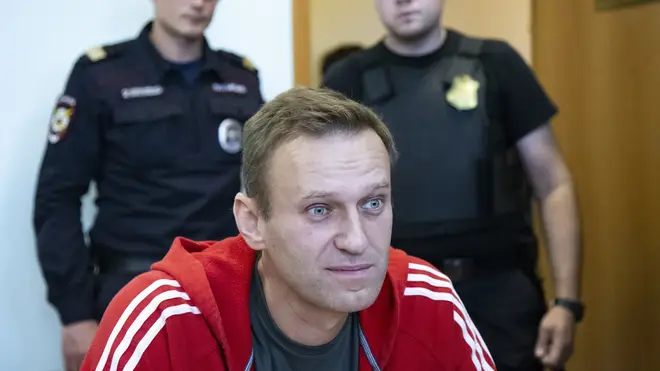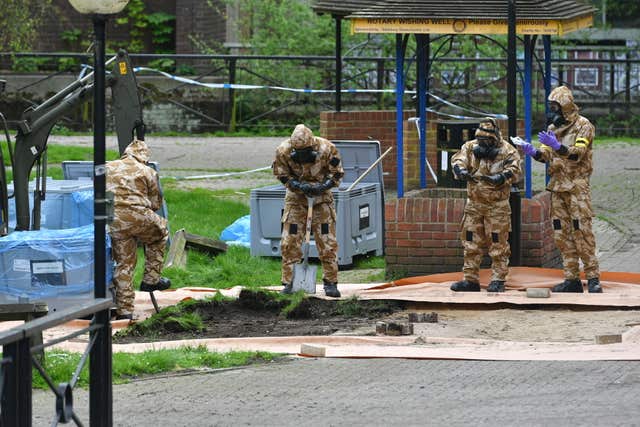
Tom Swarbrick 4pm - 6pm
14 September 2020, 15:24

Alexei Navalny fell ill on a Russian domestic flight on August 20.
Russian opposition leader Alexei Navalny’s health has improved so he is now able to leave his bed briefly, the Berlin hospital treating him has said.
It comes after Germany announced French and Swedish labs have confirmed its findings that he was poisoned with the Soviet-era nerve agent Novichok.
Mr Navalny, the most prominent opponent of Russian President Vladimir Putin, was flown to Germany two days after falling ill on August 20 on a domestic flight in Russia.

He is being treated at Charite hospital in Berlin, which said Mr Navalny has now been “successfully removed from mechanical ventilation”.
“He is currently undergoing mobilisation and is able to leave his bed for short periods of time,” it added.
The statement does not address the long-term outlook for the 44-year-old Russian politician and anti-corruption investigator.
Doctors have cautioned that even though he is recovering well, long-term health problems from the poisoning cannot be ruled out.
The Kremlin has bristled at calls from German Chancellor Angela Merkel and other world leaders for Russia to answer questions about the poisoning, denying any official involvement and accusing the West of trying to smear Moscow.

Earlier on Monday, the German government said tests by labs in France and Sweden had backed up earlier findings by a German military lab that Mr Navalny was poisoned with Novichok.
It is the same class of Soviet-era agent that British authorities said was used on former Russian spy Sergei Skripal and his daughter in Salisbury in 2018.
The Hague-based Organisation for the Prohibition of Chemical Weapons is taking steps to have samples from Mr Navalny tested at its reference laboratories, German government spokesman Steffen Seibert said.
He said Germany had asked France and Sweden for an independent examination of the findings.
German officials said labs in both countries, as well as the OPCW, took their own new samples from Mr Navalny.
“In efforts separate from the OPCW examinations, which are still ongoing, three laboratories have meanwhile independently of one another presented proof that Mr Navalny’s poisoning was caused by a nerve agent from the Novichok group,” Mr Seibert said.
“We once again call on Russia to make a statement on the incident,” he added.
“We are closely consulting with our European partners regarding possible next steps.”

Mr Seibert would not identify the specialist French and Swedish labs at a regular government news conference.
But the head of the Swedish Defence Research Agency, Asa Scott, told Swedish news agency TT: “We can confirm that we see the same results as the German laboratory – that is, that there is no doubt that it is about these substances.”
French President Emmanuel Macron expressed his “deep concern over the criminal act” that targeted Mr Navalny during a phone call with Mr Putin on Monday, his office said.
Mr Macron confirmed France reached the same conclusions as its European partners on the poisoning, according to the statement.
“A clarification is needed from Russia within the framework of a credible and transparent investigation,” it added.
The Kremlin said Mr Putin “underlined the impropriety of unfounded accusations against the Russian side” and emphasised Russia’s demand for Germany to hand over Mr Navalny’s analyses and samples to Russian experts.
Mr Putin also called for joint work on the case by German and Russian doctors.
Russian authorities have prodded Germany to share the evidence that led it to conclude “without doubt” that Navalny was poisoned with Novichok.
Berlin has rejected suggestions from Moscow that it is dragging its heels.
Asked why no samples have been given to Russia, German Foreign Ministry spokeswoman Maria Adebahr replied: “Mr Navalny was in Russian treatment in a hospital for 48 hours.
“There are samples from Mr Navalny on the Russian side.”
She added Russia has “all the information and all the samples it needs for an analysis”.
Once he became ill, Mr Navalny was treated at a hospital in the Siberian city of Omsk, where Russian doctors said no evidence of poisoning could be found and claimed he was too unstable to be transferred.
A German charity sent a medical evacuation plane to take him to Berlin for treatment, which it did after German doctors said he was stable enough to be moved.
Mr Navalny was kept in an induced coma for more than a week as he was treated with an antidote before hospital officials said a week ago that his condition had improved enough for him to be brought out of it.